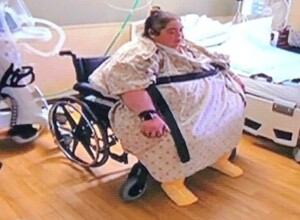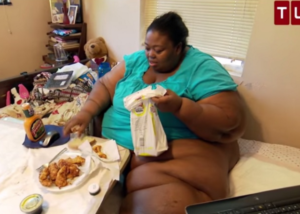
Do the enablers in “My 600 Pound Life” have a mental illness?
They must have as much of a psych issue as do the super morbidly obese people they continue to bring enormous amounts of food to.
How often have you heard an enabler of one of the subjects of “My 600 Pound Life” say something like, “I bring her the food because it makes her happy”?
One must wonder what kind of parents these enablers would or do make. It’s easy to picture the following scenario:
“I let eight-year-old Mindie play alone in the street after dark because it makes her happy.”
“I let Johnnie skip school all the time and watch TV all day instead because it makes him happy.”
When 24-year-old Adele, the enabler to her 800-pound mother, Marla, said, “It makes her happy,” in reference to why she keeps bringing her bedridden mother gigantic portions of junk food, I thought:
“Will YOU be happy when you soon become the cause of your mother’s death?”
“Will your mother be happy in her final moments when she’s struggling to breathe from a heart attack?”
TLC should come out with another show called “My 600 Pound Life: Inside the Mind of the Enablers.” Or, we can just shorten that: “My 600 Pound Life: The Enablers.”
This popular show, for which I watch every episode, should have a spinoff series about the enablers.
The psychological forces behind the mind of an enabler to a 600 pound person would make an utterly fascinating series.
It’s just mind-bending how someone could be “afraid” of the person they enable, even though that person is:
- NOT providing financially to the enabler in some cases
- NOT capable of physically harming the enabler due to mobility limitations
- NOT capable of getting the enabler fired from a job
But in order for TLC to generate a spinoff series from “My 600 Pound Life,” they’d have to find enablers who are willing to be followed.

Questions Views Ask About the Enablers
What drives people like Adele, or the voiceless Dillon who enables his mother Pauline, to devote their entire lives to doing things like lifting the heavy folds of fat to clean out all the infected, pus-filled sores beneath them; to spend inordinate amounts of time shopping for junk food, then serving it to their parents, spouses or significant others — and sometimes the 600-pounder is a grown child, and the parents are the enablers.
What compels these enablers to have no life, to give up school, a social life, a romantic life, the possibility of a career?
They come across as devoted and loving, but they are in need of psychological help, and their behaviors are destructive—they are key contributors to the slow suicide of their loved-ones.
People do not become 600 pounds overnight.
In “My 600 Pound Life,” there has been an occasional subject who was mobile enough to require little enabling.
Chuck was one of them – able to get into a vehicle at will and drive out for fast-food. He was so mobile, in fact, that he even participated in loading a vehicle for his trip to Houston to see “Dr. Now.”
But in nearly all the other cases, there is at least one enabler. How can someone live like this?
I realize it’s more difficult for the enabler to cease this destructive behavior if they began taking care of a super morbidly obese parent during childhood.
But in some of the shows, the parent begins piling on weight (according to the subject’s story telling) when the enabler is either an older child or approaching young adulthood.
Furthermore, what’s going on with the enablers of spouses or significant others?
We can’t blame childhood patterns on this, since these enablers were not taking care of their spouses (or girlfriends) as children.
Maybe as children, they were taking care of a super morbidly obese family member, and that started the pattern.
There has to be something that went significantly awry in the emotional development of the enabler during childhood.
What they do is akin to repeatedly bringing alcohol to an alcoholic with liver disease.
- What kind of childhood potentially begets an enabling mindset?
- How is it that they are eventually drawn to the 600-pound subject’s way of thinking?
And the question specifically pertains to three types of enablers:
- The adult who’s been “taking care of” the super morbidly obese parent since childhood (we can see Liam, the very young son of the non-compliant Penny, being groomed to be her caregiver/enabler as he gets older).
- The adult who began “taking care of” the 600-pound parent at an older age or young adulthood
- The adult who hopped on the enabling train only after entering adulthood, because the subject is a significant other or spouse.









































